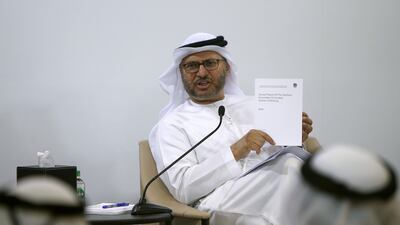ABU DHABI // Three people were jailed for life and 106 arrested last year in the UAE’s battle against human trafficking, said the Ministry of Foreign Affairs and International Cooperation.
Last year, 25 cases were reported, up from 17 in 2015.
Most of the 34 victims last year were women who were trafficked to the UAE for prostitution, and three cases involved the sale of children.
Officials said the rise in reported cases was thanks to the vigilance and hard work of the authorities in spotting victims and letting them know that help is at hand.
Dr Anwar Gargash, Minister of State for Foreign Affairs, said the UAE, a major transit hub, was on high alert to fight human trafficking.
“It’s a very complex and transnational problem,” he said in unveiling the 2016 Annual Report of the National Committee to Combat Human Trafficking in Abu Dhabi yesterday.
“It’s always been described as an iceberg. So whatever you catch at the top of the surface does not really convey the real depth of the problem.
“Like every society in the world, you understand you have your challenges.
“This is a very attractive, stable and prosperous part of the Middle East. As a result, it will attract a huge number of people who want to live a righteous life.
“But it will also bring the wrong sort of people who will try to prey on the vulnerable and the weak. So when it comes to human trafficking, this is the worst case because they prey on the weakest and it’s done in the most despicable way.”
Over the past decade, the UAE has been combating human trafficking by training judges, prosecutors and police officers, as well as setting up rehabilitation shelters.
“It was extremely important for us to raise awareness because the problem you face with human trafficking is complex,” Dr Gargash said.
“It’s very important to empathise with victims but also to understand that what looks to you as a sinister, sexual crime is actually much deeper than that.”
He said human trafficking cases were best handled by specialist prosecutors and judges who were familiar with such crimes.
“We added more elements to the programmes of police officers,” Dr Gargash said.
“We have to take the stigma away from the problem, open our eyes and accept that this is an attractive society and as such, there are a lot of positive stories, but also some negativity we have to tackle.”
Last year, Shelters for Victims of Human Trafficking cared for 18 victims – 14 from Asia, two from Africa and two from Europe.
“We’ve been consistently dealing with it, which gave us credibility,” said Dr Gargash. “In the past few years, we’ve been coordinating between all parts of society and government and it’s been a successful model.”
In most cases, the human traffickers and victims are from the same country.
“The way forward is to work diligently on all aspects including victim support, prosecution, awareness, international cooperation and international networking along with training,” Dr Gargash said.
“Ten years down the road, we have a very successful programme and we are doing it without too much fuss. The report shows that the UAE is committed and serious about this programme.”
Experts said human trafficking was a global phenomenon. “The bane of human trafficking requires international efforts to eliminate it,” said Dr Albadr Al Shateri, professor of politics at the National Defence College.
“The international community and the UAE in particular is giving it its due attention.
“Eradicating modern-day slavery is a challenge that would require gargantuan undertaking not different from the slave trade of yore. It will be a tough slog but the civilised world will win.”
cmalek@thenational.ae

